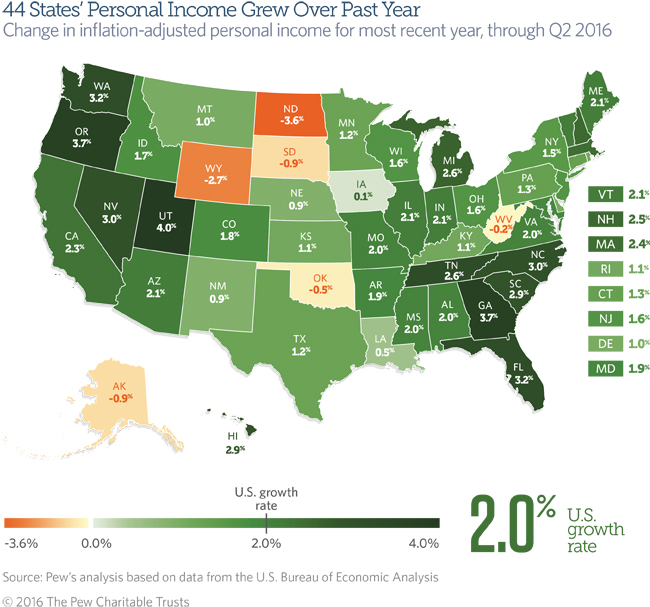Connecting state and local government leaders
These trends matter for state governments, because tax revenue and spending demands may rise or fall along with residents’ incomes.
This article was originally published at States' Fiscal Health, an initiative of The Pew Charitable Trusts, and was written by Barb Rosewicz, Ruth Mantell and Joe Fleming.
One of the longest U.S. economic expansions has lifted personal income in all states. But growth has varied, from a constant annual rate of less than 1 percent in Nevada to almost 5 percent in North Dakota since the start of the Great Recession. Weakness in energy and agricultural earnings trimmed gains for six states for the year ending in the second quarter of 2016.
Nationwide, growth in personal income has been slower than usual. Since the downturn began in the fourth quarter of 2007, estimated U.S. personal income has increased by the equivalent of 1.7 percent a year through the second quarter of 2016, compared with the equivalent of 2.8 percent a year over the past 30 years, after accounting for inflation.
States have recovered at different paces. Only in mid-2015 did the final state—Nevada—recover its personal-income losses and return to its pre-recession level. Since the end of 2007, personal income in 18 states has grown faster than in the nation as a whole, after adjusting for inflation.
Looking at recent trends, data indicate that inflation-adjusted personal income rose by 2 percent in the second quarter of 2016 from a year earlier, with 23 states outpacing U.S. growth. Although six states recorded year-over-year declines, their personal income remained higher than before the recession. These results are based on estimates and subject to revision.
Personal income estimates are widely used to track state economic trends. As the economy expands or shrinks, state personal income also changes. These trends matter not only for individuals and families but also for state governments, because tax revenue and spending demands may rise or fall along with residents’ incomes. Comprising far more than simply employees’ wages, the measure counts all sorts of income received by state residents, such as earnings from owning a business or investing, as well as benefits provided by employers or the government.

Trends in inflation-adjusted personal income since 2007, the onset of the recession, indicate:
- North Dakota has enjoyed the fastest annualized growth (4.7 percent) since the start of the recession, even though a worldwide drop in petroleum prices has cooled its oil boom and led to the sharpest drop (3.6 percent) in personal income in any state over the past year.
- The next-fastest growth over the past 8½ years has been in Texas (3 percent), Utah (2.5 percent), Alaska and Colorado (each 2.3 percent), and Oklahoma (2.2 percent). All but Utah are leading oil producers.
- Nevada, where home prices and construction earnings plunged when the housing bubble burst, has had the slowest growth among all states: an annualized rate of just 0.5 percent since the fourth quarter of 2007. But a turnaround in construction has given the state the sixth-fastest growth rate (3 percent) over the past year.
- The next-slowest growth since the start of the recession has been in Illinois (0.8 percent), followed by Alabama, Connecticut, and Maine (each 0.9 percent).

Trends in personal income for the second quarter of 2016, based on preliminary estimates, adjusted for inflation and compared with a year earlier, indicate:
- The five states with the fastest personal income growth over the year ending in the second quarter of 2016 were Utah (4 percent), Georgia (3.7 percent), Oregon (3.7 percent), and Washington and Florida (each 3.2 percent).
- The six states where personal income fell were North Dakota (by 3.6 percent), Wyoming (2.7 percent), South Dakota and Alaska (each 0.9 percent), Oklahoma (0.5 percent), and West Virginia (0.2 percent). All were hurt by declining earnings in the mining industry, which includes coal, natural gas, and oil production. Weak farm earnings also hit Oklahoma, South Dakota, and Wyoming.
- Among the 44 states with gains, Iowa’s expansion was the slowest, rising by just 0.1 percent.
- Oregon and Utah stand out as the only states with one-year growth rates that ranked among the five fastest during each of the most recent four quarters.
- Likewise, North Dakota and Wyoming have consistently posted the sharpest one-year contractions in personal income during each of the most recent four quarters.
Between the second quarters of 2015 and 2016, personal income rose faster in 31 states than it did since the end of 2007, showing an economic pickup. In 13 states—Colorado, Delaware, Idaho, Iowa, Kansas, Kentucky, Louisiana, Minnesota, Montana, Nebraska, New Mexico, New York, and Texas—personal income increased in the past year but at a slower pace than each state’s constant growth rate since the recession, indicating that the expansion had cooled somewhat. In the six states where personal income contracted over the past year, those drops pared longer-term economic gains.
Some ups and downs since recession
The steady pace that income would have to rise each year to reach its latest level is the constant growth rate. These rates provide a way to compare states’ growth. However, personal income did not actually change at a steady pace since the recession, instead falling in some years and rising in others. (See the “Year by year” tab for annual results in each state between calendar years 2007 and 2015)
Comparing total inflation-adjusted dollars in each calendar year, personal income fell in just five states in 2008, but 49 states in 2009, with West Virginia the only state to escape the 18-month recession without a drop in personal income. The country rebounded over the next three years: Forty-six states’ personal income rose in 2010—Arizona, Delaware, Kansas, and North Carolina being the exceptions. All states saw increases in 2011, and all but Delaware and Georgia experienced gains in 2012. In 2013, personal income fell in 36 states, reflecting a number of taxpayers’ accelerating income into 2012 in anticipation of a potential federal tax increase in 2013. The rebound resumed over the next two years, with personal income rising in every state but Kansas in 2014 and every state but North Dakota and Wyoming in 2015.
What is personal income?
Personal income tallies residents’ paychecks, Social Security benefits, employers’ contributions to retirement plans and health insurance, income from rent and other property, and benefits from public assistance programs such as Medicare and Medicaid, among other items.
Federal officials use state personal income to determine how to allocate support to states for certain programs, including funds for Medicaid. State governments use personal income statistics to project tax revenue for budget planning, set spending limits, and estimate the need for public services.
Looking at personal income per capita or state gross domestic product, which measures the value of all goods and services produced within a state’s borders, can yield different insights on state economies.
Download the data to see state-by-state growth rates for personal income from 2007 through the second quarter of 2016. Visit Pew’s interactive resource Fiscal 50: State Trends and Analysis to sort and analyze data for other indicators of state fiscal health.

NEXT STORY: A Municipal Model for Place-Based Impact Investing



